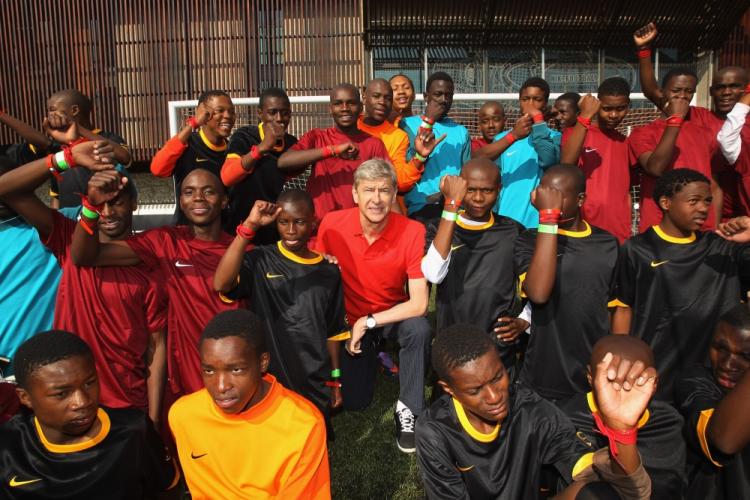MUNICH—As the World Cup kicked off in South Africa, the entire globe is watching the games on TV filled with great soccer action and, of course, lots of advertising.
While all 32 teams are competing in South Africa, Nike Inc. and Adidas are having their own advertising World Cup where the two of the biggest sporting-gear companies compete against each other head-to-head for precious airtime and brand recognition.
Last week, U.S.-based sportswear company Nike Inc. created a YouTube advertisement capturing very emotional moments of the game’s best players such as Portugal’s Cristiano Ronaldo, England’s Wayne Rooney, and Brazil’s Ronaldinho as they showcase their dribbling talent and amazing ball tricks to score goals. The video was viewed 15.3 million times since its creation on May 17.
Nike’s German rival Adidas AG also created a YouTube advertisement video—a humorous depiction of a Star Wars scene with England’s David Beckham escaping from Storm Troopers and rapper “Snoop Dogg” chopping up bad guys with a lightsaber. The video was viewed 3.2 million times since June 4.
According to Nielsen Media Research, a company specializing in producing TV ratings statistics, from May 7 to June 6 among all the English-language advertising related to the World Cup, Nike was mentioned 30.2 percent of the time and Adidas was second with 14.4 percent.
As much as both companies want the limelight during the World Cup and must pay a very high price to get a bit of precious airtime. For example, according to a BusinessWeek report, ITV Plc, U.K.’s largest commercial broadcaster, charged $437,000 for advertisements during the games broadcasting England’s matches versus the United States and Algeria. TF1, a French media company, charges $313,000 for a 30-second spot during France’s matches.
Besides airing advertisements, Nike and Adidas both took part in sponsoring teams participating in the World Cup. Adidas fully sponsors 12 teams including Spain, Germany, Argentina, and the host South Africa. Nike sponsors nine teams including Brazil, the Netherlands, the United States, and England.
Both rivals hope that one of their sponsored teams wins the World Cup, as their brand would get lots of attention and therefore a great chance to leverage the win to increase their revenues for the next four years to come before the next World Cup. Soccer is the most popular sport globally.
Charlie Denson, the CEO of Nike, would be thrilled to see one of his teams win the World Cup and says that the win could deliver “a great impact on the overall revenue potential that we would have. The last time Brazil won was eight years ago when our soccer effort was in its infancy. What would the impact be if Brazil wins today? I’m not sure, but it would be a lot bigger than it was eight years ago,” he said in a statement.
Adidas thought that it has gotten a step ahead, by having a right to produce the official World Cup soccer ball, named “Jabulani” (which means rejoice in Zulu), which is a symbol of the tournament for the next four years to come. Interestingly enough, the ball has received a lot of criticism from players due to its unpredictable bouncing effects.
According to the Telegraph, former English striker, Alan Smith, has tried the Jabulani out and concluded that it “behaves like no other I have kicked in my life.”
While all 32 teams are competing in South Africa, Nike Inc. and Adidas are having their own advertising World Cup where the two of the biggest sporting-gear companies compete against each other head-to-head for precious airtime and brand recognition.
Last week, U.S.-based sportswear company Nike Inc. created a YouTube advertisement capturing very emotional moments of the game’s best players such as Portugal’s Cristiano Ronaldo, England’s Wayne Rooney, and Brazil’s Ronaldinho as they showcase their dribbling talent and amazing ball tricks to score goals. The video was viewed 15.3 million times since its creation on May 17.
Nike’s German rival Adidas AG also created a YouTube advertisement video—a humorous depiction of a Star Wars scene with England’s David Beckham escaping from Storm Troopers and rapper “Snoop Dogg” chopping up bad guys with a lightsaber. The video was viewed 3.2 million times since June 4.
According to Nielsen Media Research, a company specializing in producing TV ratings statistics, from May 7 to June 6 among all the English-language advertising related to the World Cup, Nike was mentioned 30.2 percent of the time and Adidas was second with 14.4 percent.
As much as both companies want the limelight during the World Cup and must pay a very high price to get a bit of precious airtime. For example, according to a BusinessWeek report, ITV Plc, U.K.’s largest commercial broadcaster, charged $437,000 for advertisements during the games broadcasting England’s matches versus the United States and Algeria. TF1, a French media company, charges $313,000 for a 30-second spot during France’s matches.
Besides airing advertisements, Nike and Adidas both took part in sponsoring teams participating in the World Cup. Adidas fully sponsors 12 teams including Spain, Germany, Argentina, and the host South Africa. Nike sponsors nine teams including Brazil, the Netherlands, the United States, and England.
Both rivals hope that one of their sponsored teams wins the World Cup, as their brand would get lots of attention and therefore a great chance to leverage the win to increase their revenues for the next four years to come before the next World Cup. Soccer is the most popular sport globally.
Charlie Denson, the CEO of Nike, would be thrilled to see one of his teams win the World Cup and says that the win could deliver “a great impact on the overall revenue potential that we would have. The last time Brazil won was eight years ago when our soccer effort was in its infancy. What would the impact be if Brazil wins today? I’m not sure, but it would be a lot bigger than it was eight years ago,” he said in a statement.
Adidas thought that it has gotten a step ahead, by having a right to produce the official World Cup soccer ball, named “Jabulani” (which means rejoice in Zulu), which is a symbol of the tournament for the next four years to come. Interestingly enough, the ball has received a lot of criticism from players due to its unpredictable bouncing effects.
According to the Telegraph, former English striker, Alan Smith, has tried the Jabulani out and concluded that it “behaves like no other I have kicked in my life.”






